From Paradigm Summer 2021, Issue 6.2
MID-CITY PHILOSOPHY
Sitting squarely in the middle of L.A.’s chaos, beauty and everything in between gives Watch Out the unique perch it’s playing from.
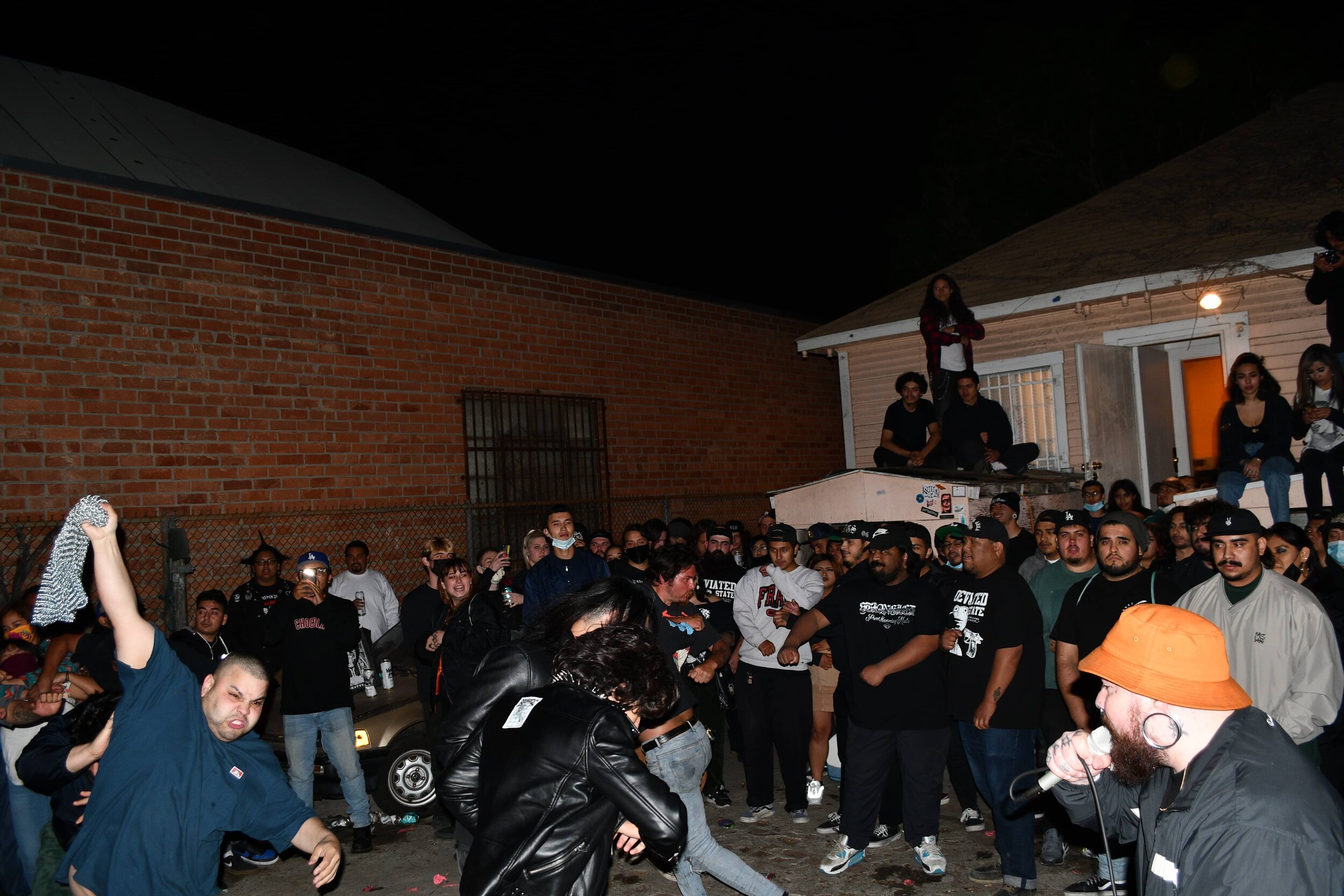
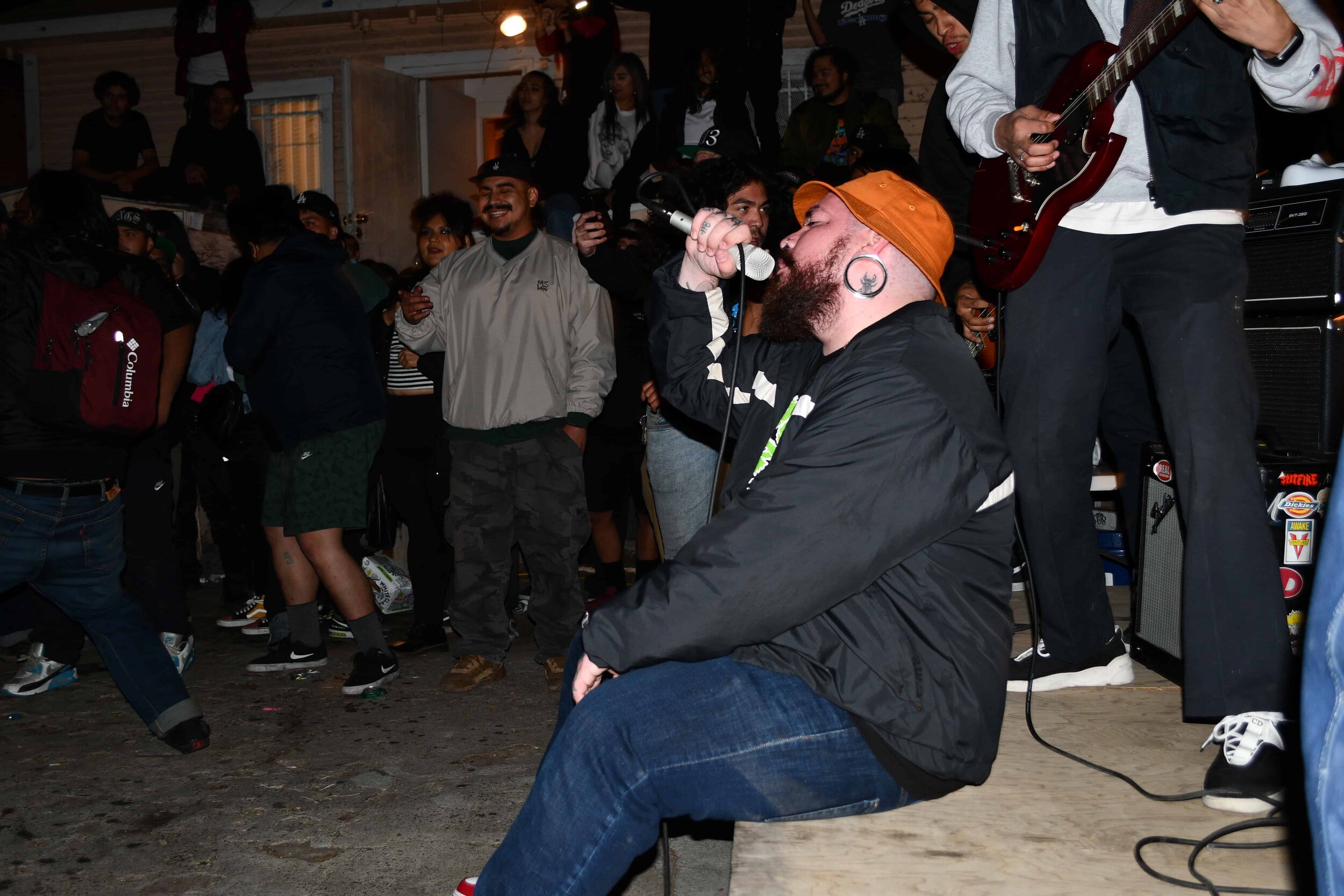
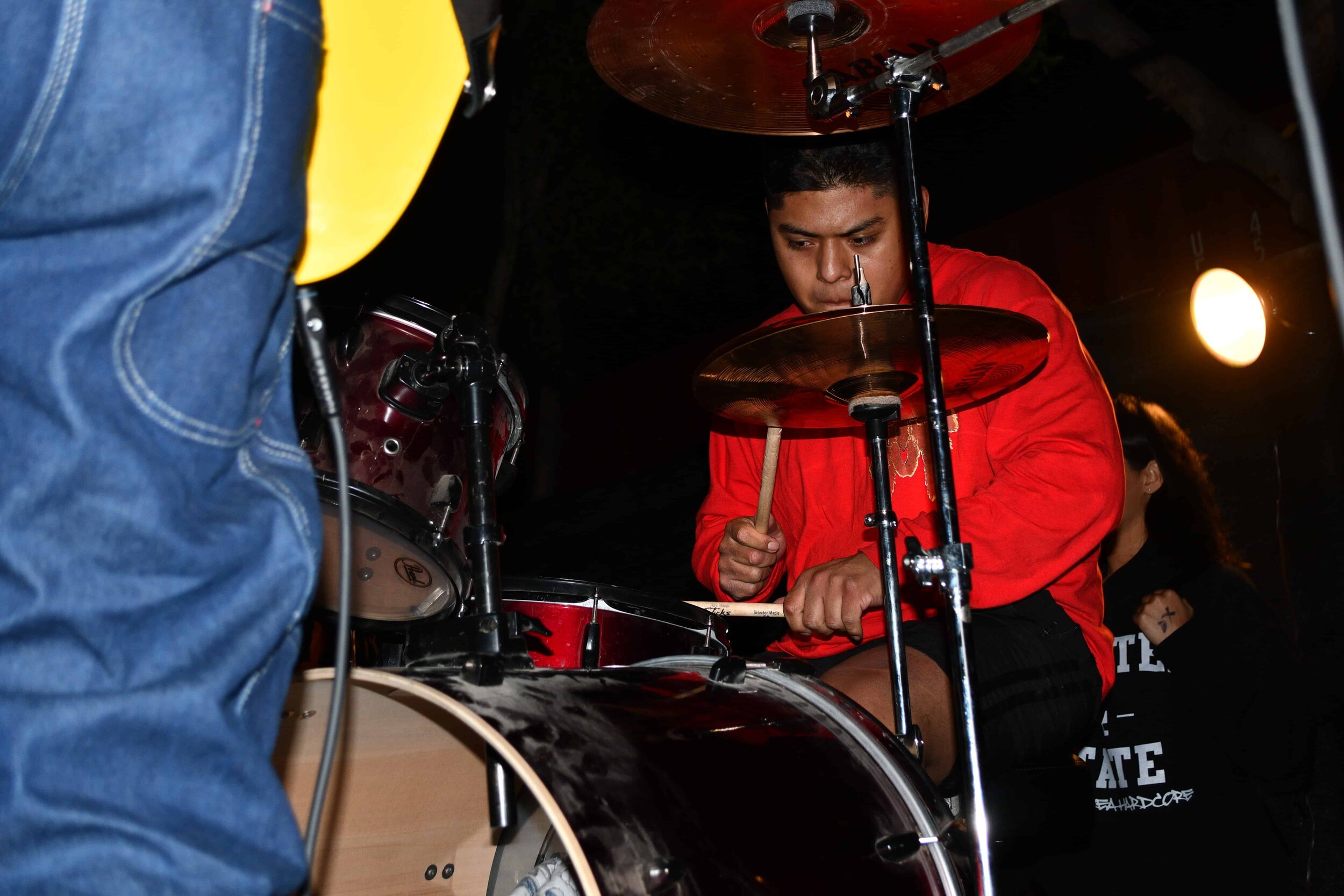
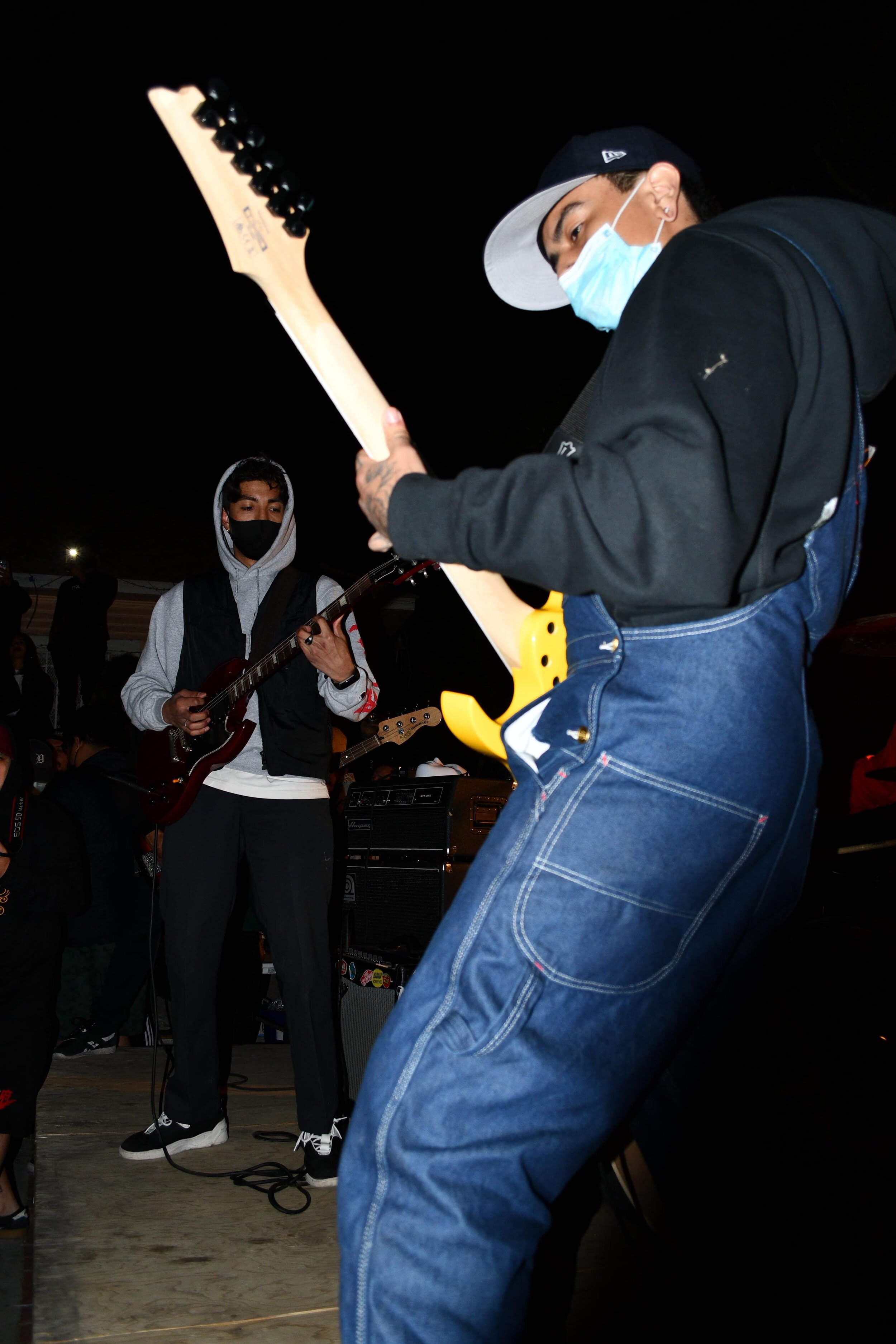
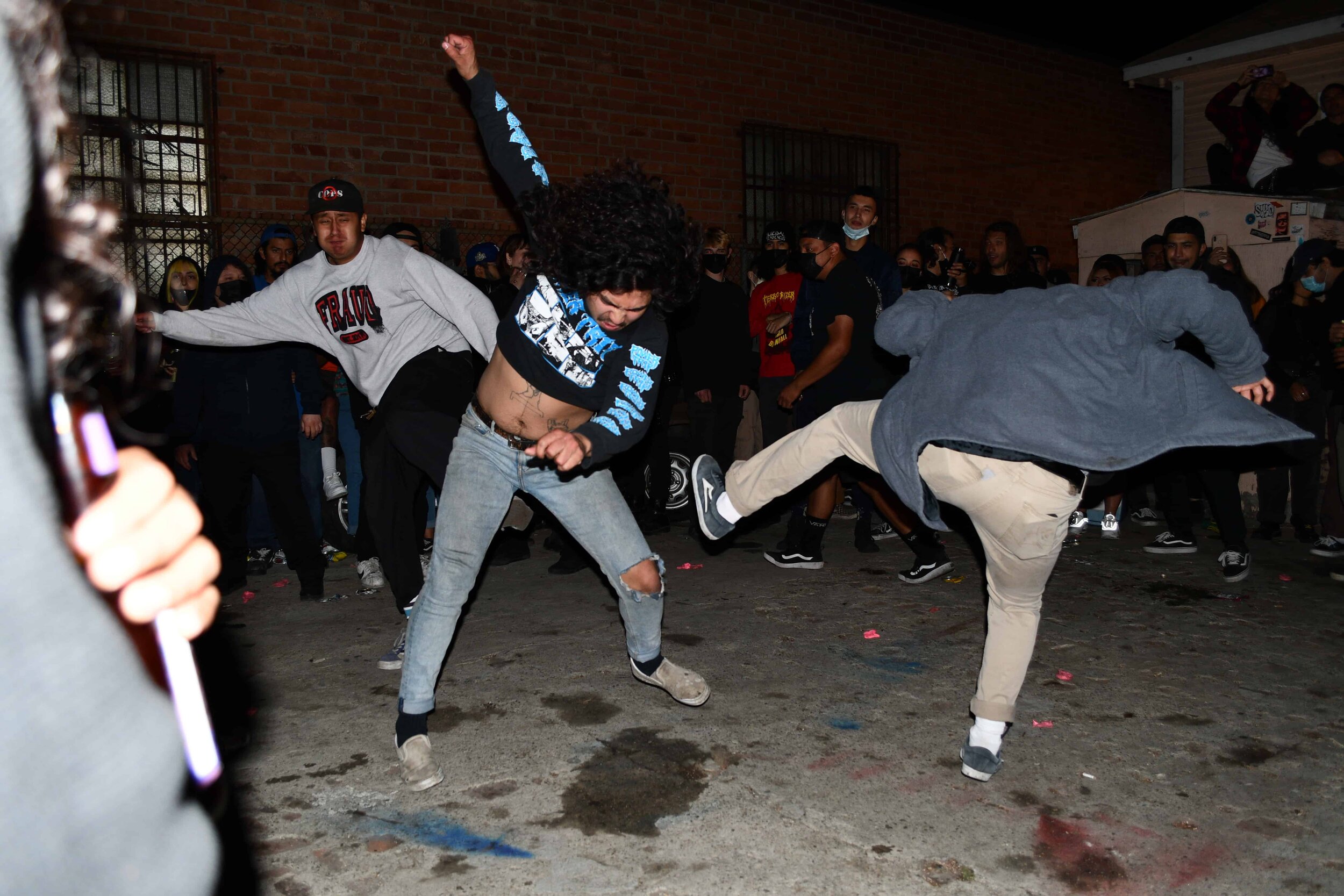
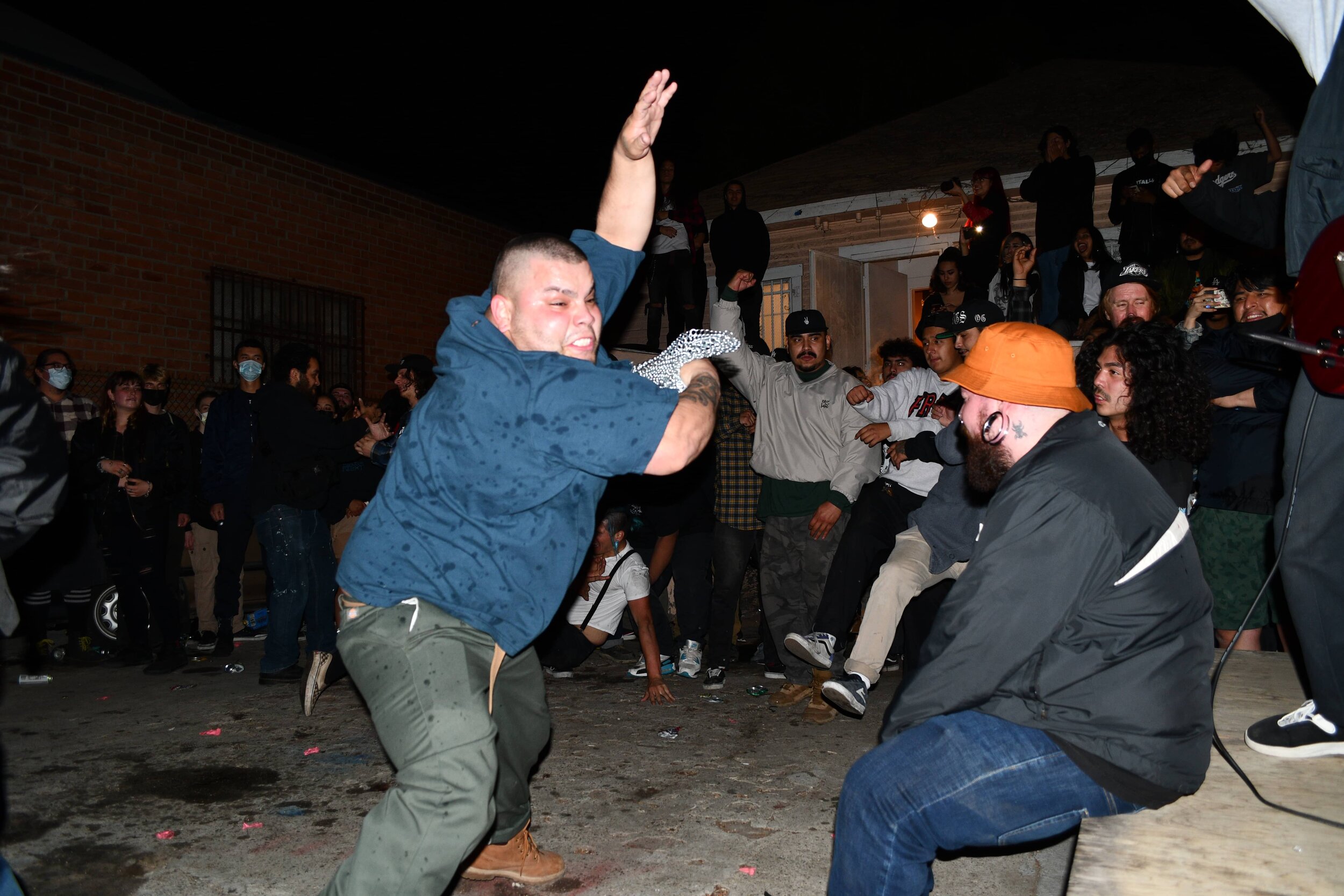
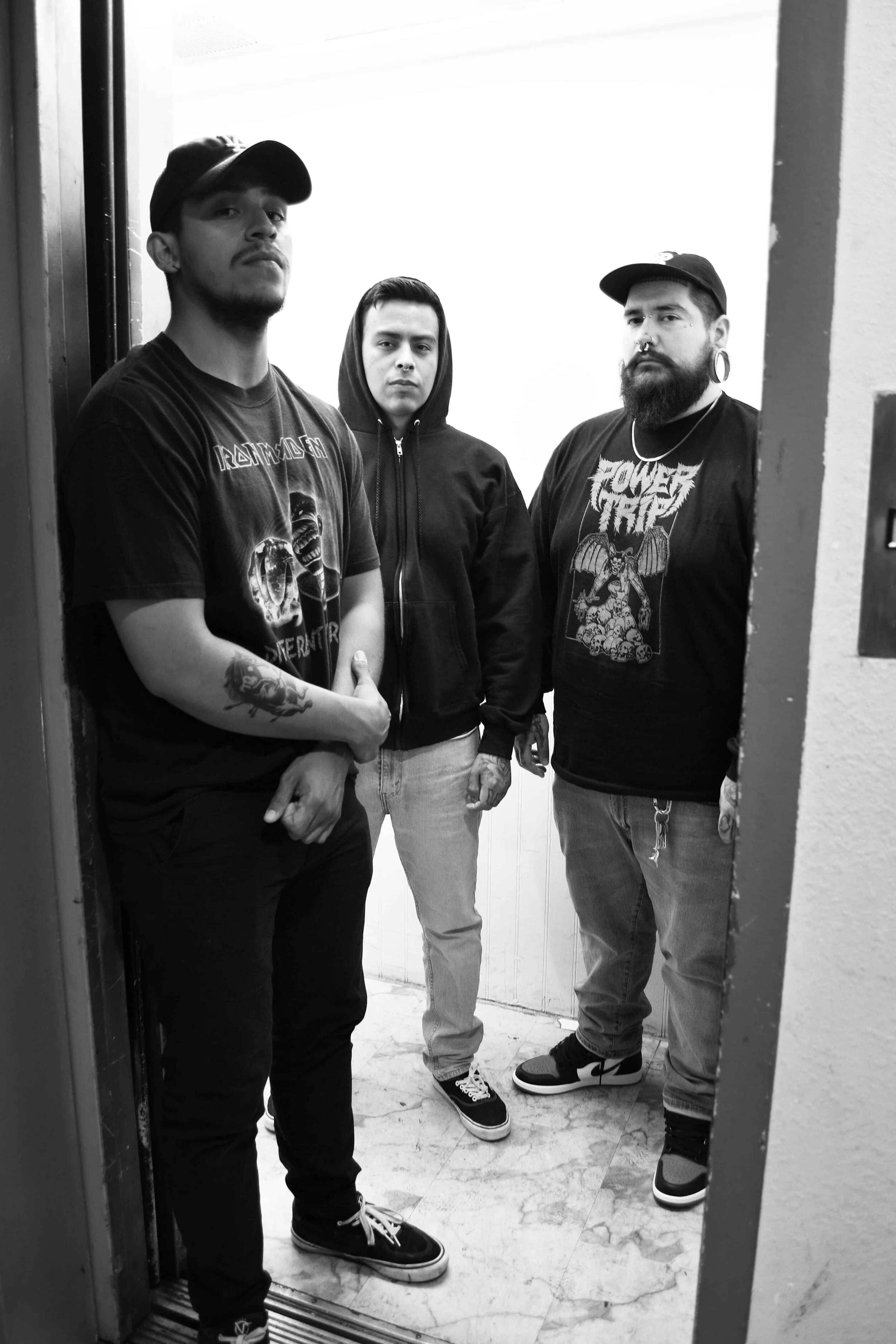
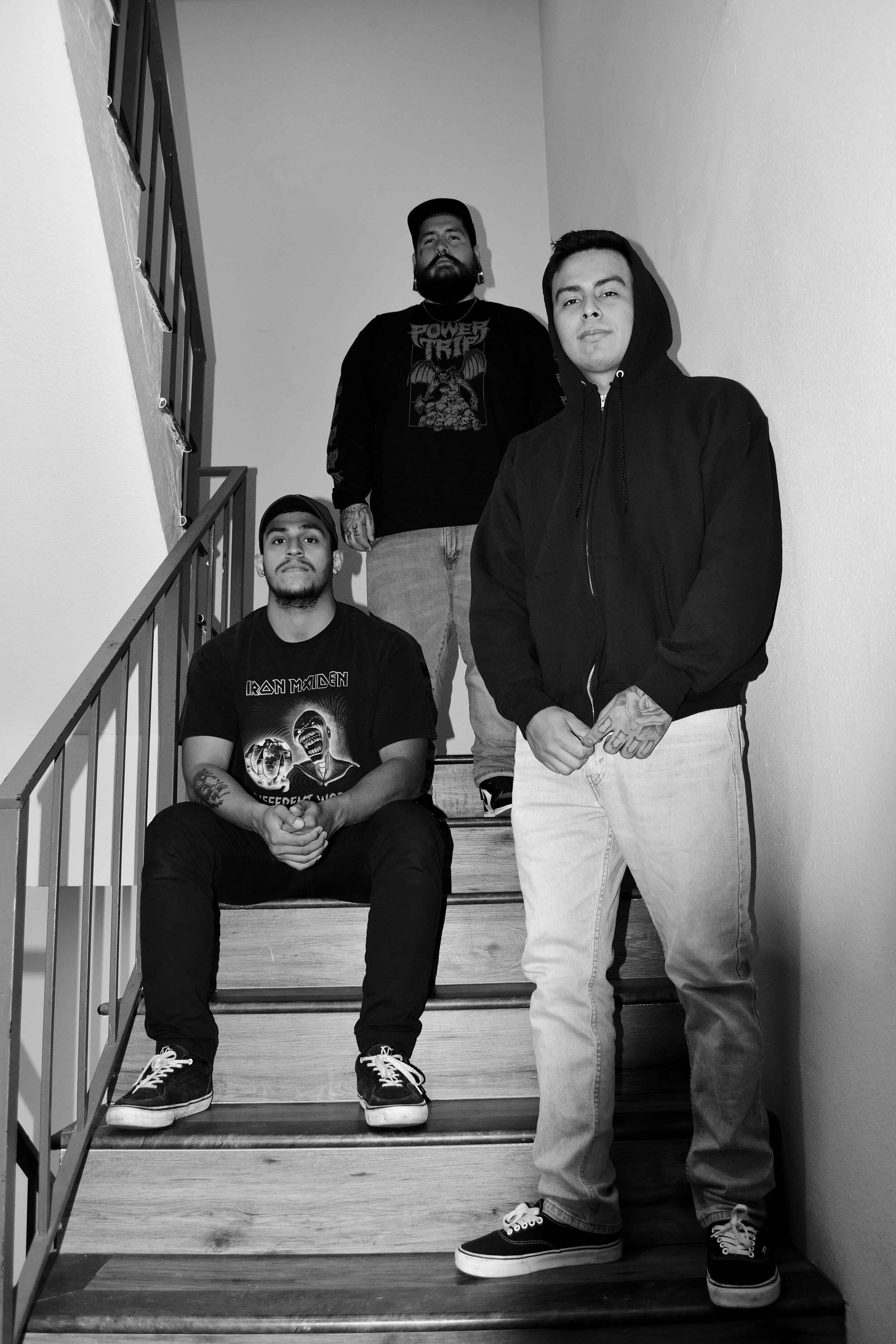
BY KARI HAMANAKA
Mid City. Maybe you’ve driven through it, noting the signs setting off the area and the inconsistency in whether it should read hyphenated or not. Maybe you’ve heard of it but scratch your head at the geographical boundaries defining the Los Angeles neighborhood that sits central within the city creating an interesting vantage point from which to live-or sing about.
Mid-City hardcore band Watch Out started in March 2020, right as the city of Los Angeles and the broader state retreated into a strict, stay-at-home order in response to the pandemic. Movement within California was restricted beginning at 10 p.m., just about the time most people going out to a show are getting their evening started.
“All of us risked getting tickets coming over to practice,” Edgar, the band’s bassist, recalled. “The streets were fucking empty as fuck, and we would just go to and from practice.”
“We started that shit during prime COVID. When we went home, we would be like, ‘Everybody, go, go, go,’” added singer Jorge.
WATCH OUT IS:
▶ SERGIO, guitar
▶ EDGAR, bass
▶ JORGE, vocals
▶ SAUL, second guitarist
▶ ANGEL, drums
What began as one of those moments where a couple people laugh over talking about starting a band-an idea typically fizzling as fast as it’s proclaimed-has turned into one of the more interesting area bands to be born out of 2020. Friends who grew up in the same area of Mid City began jamming every now and then, until the sporadic sessions became a weekly thing once COVID restrictions lifted, and Watch Out took off from there.
“We’ve seen a lot and I feel like that was really why we started and that’s why when I started the band, I chose them,” guitarist Sergio said as he sat at the kitchen table with Edgar and Jorge on a recent evening to talk about the impetus for Watch Out. “These are the guys I want to be in a band with because I know they’re hungry for it and, from the music, I can tell they want more.”
Watch Out may be a relatively new name in the scene, but it’s comprised of seasoned musicians hardly in need of proving themselves. Rather, the band launched standing on solid ground.
“Deface,” their five-song debut EP, offers a solid look at where this band is going.
“The approach to it is less is more because whenever we feel like we’re overcompensating for it, because we’re all from a history of different bands, what we do is we analyze it, pick it apart and see what works. Then we just keep going,” Edgar explained.
The end result of “Deface” is something with largely no contemporary reference among locals and what Edgar called a cocktail of different interests.
Watch Out then is a reflection of the aggregate of the five-piece’s individual learnings from past bands, time throwing shows and sharpening their musical skills.
“I used to be in another band, too, and I was just getting kicked out all the time,” Edgar said. “Honestly, it was just communication. You’ve got to be in the room and communicate what you like and don’t like, and if you’re not open to certain ideas or certain things when it comes to music and you can’t articulate it well, then there’s usually going to be a bunch of bumping heads. That’s why I left, or got kicked out, because I was just really stern in my opinions, but it worked out for the best.”
Indeed it did.
When Sergio and Jorge decided they wanted to erect a band together, the two were aiming for a serious endeavor, unlike Sergio’s more recent former band, which ended after one show. He attributed the abrupt stop to too much drug use by some of the members.
“I wasn’t trying to have them like that,” he said. “It just slowed everything down.”
The guitarist, who is apt to be studying philosophy or psychology when not playing music, described Watch Out as a channel for what they may be going through at any given time.
“That’s what I always try doing; I always try making a story without lyrics,” he said. “If I can make someone feel with the music, then I feel like I’m doing something correct.”
The group threw around a few band names, including Taskmaster, but Jorge is the one who came up with Watch Out.
“Back then, I was more problematic, I guess, getting into fights and stuff,” he said of where the name stemmed from. “I felt like that’s something I would always hear when someone would come out with a bottle or a knife or some shit. Someone would say ‘watch out’ or ‘look out.’ So, I was corresponding to that and those types of experiences.”
“That’s what I always try doing; I always try making a story without lyrics. If I can make someone feel with the music, then I feel like I’m doing something correct.”
Funny enough, the five grew up within walking distance of one another, but didn’t go to school together and never knew each other until they started getting into music.
Sergio came up in the ska scene after around the age of 10 having his dad show him the drums.
“From there, it just went on,” he said.
In the case of Jorge, who described himself as Japanese cartoon-watching “simple folk,” his older brother would go to ska, punk and metal shows, exposing his younger sibling to the music.
“When my mom went to work, my brother would babysit me. What would happen is that he would pick me up from elementary school and would take me to shows,” Jorge recalled. “So I was around it. I would see him play and do his own thing. When I got old enough, when I was 17, I started going out with my friends to ska shows, punk shows, metal shows around L.A. and that’s how it started.”
“It’s funny how we get tossed into it and then it takes off on its own,” said Edgar. “For me, personally, I grew up listening to a lot of Spanish music, cumbias and stuff, especially with my uncles. They would get super blasted at my mom’s house and bump a bunch of music, and one of my earliest memories was right around the time I was five my uncle would bump a lot of Metallica.”
The early exposure either catapulted them into the scene or, at the least, sat ruminating for a few years before later appearing.
Weekends became filled with shows, traveling to different L.A. neighborhoods, with the height for them they say being right around the 2010s, especially in places like South Central.
Edgar, who grew up in Koreatown, remembers the first show they threw next to a pizza place.
“It was Throat Off, Union Front and some other bands,” he said. “It was really unorthodox, but it felt good like, damn, we could put on a show here in K Town? And, what’s going on right now is there’s so much gentrification. It was a coffee shop, but it’s always getting leased out. When you pass by, it could be a pizza spot. And the next time you pass by it could be a café. And next time someone could be living in there.”
Around the mid-2010s is when the group became involved with what can best be described as a collective, for a moment in time they say was rooted in activity around Crumb Bum Records and a house where shows and festivals took place.
“I feel like that group really made a huge impact on the hardcore scene,” Sergio said of CBR. “It kind of made a home for it. It was already established, but it brought up a lot of different bands to just play different music.”
The concept’s name is a reference to J.D. Salinger’s Catcher in the Rye when protagonist Holden Caulfield gets called a “crumb-bum” by a prostitute.
“She called him a crumb-bum because he doesn’t know how to approach his sexuality with a woman and she’s like ‘You damn crumb-bum’ and then she leaves. So that’s where the name comes from,” Sergio said. “It was American lit class. It was me, my friend Irving [Loose Ends guitarist] and Angel [Big Tech] came up with it. That took off immediately after 2015. We were all going to shows together and my friend Angel had a spot in his garage and we started throwing these festivals. People were going. It was the tiniest garage, but it was intimate and it was cool. Then the next year, you just sort of saw an evolution with it.”
The collective grew and also got bigger. More people got involved; more people came to the shows. And, as with most things, the more people joining who are farther from understanding the initial concept, the more things get murky and issues arise. Allegations of nefarious behavior by some event attendees ended up being a black eye on the CBR name.
“The thing is, once it started growing, I feel like when you start making things into a bigger thing, you have bigger problems,” Sergio said.
“Yeah, like not being careful about who you let in,” Jorge added. “It gets too out of hand and you can’t really control everything that happens.”
“Long story short, we let people in that probably weren’t even in it for the collective and things happen and that’s why that [CBR] name got shut down,” Edgar explained. “At the same time, there’s a lot of resentment because I feel like when you’re together-at least when we’re together-we treat everyone like family and when someone comes at you fucking sideways, it’s like ‘Damn, alright, for sure’ and they talk down on you. They just shit on you and they shit on your name and it’s fucked up, you know, because if we were other people, we’d fuck you up.”
“That’s the other thing, too. We’re not hood hood,” Sergio said. “We don’t come from that, but we grew up with that. We’ve lived around it our whole lives. We’ve seen a lot of things and I feel like if it was New York, we’d probably take it [differently]. We weren’t a gang or anything. We were just a big family; we were brothers. That’s what [CBR] was-a little brother collective, and things got out of hand. And a lot of people took different credits and stuff like that, and that’s where the whole thing fell.”
On the flip side, the group is rebuilding, learning from missteps with the newly formed BTA House, working alongside Loose Ends, Big Tech and their friend Murph.
“We’re putting it back together and it’s going to be stronger I would say,” Sergio said. “We got rid of the bad fruit.”
“.... I feel like when you’re together-at least when we’re together-we treat everyone like family and when someone comes at you fucking sideways, it’s like ‘Damn, alright, for sure’ and they talk down on you. They just shit on you and they shit on your name and it’s fucked up, you know, because if we were other people, we’d fuck you up”
The ultimate goal is to create something positive.
“The way I see it is it’s just to have a place for people to have fun, especially people who are coming out of high school, people who probably don’t know what they’re doing with their life,” Edgar explained.
“Yeah, I’m not saying ska saved my life, but it really showed me, ‘Hey, you know what? There’s music that you can dissect.’ Meaning, you can really look in depth into music and it can change your perspective on certain things, your energy,” Sergio said. “Unfortunately, there’s a lot of people who go to shows just to get fucked up and drunk. But I feel like for BTA, we want people to know that there’s talented people out there, especially in the hardcore community.”
The talent and the stories being told through the music, sadly, sometimes get overlooked or drowned out by the noise of those chasing clout or social media attention. Watch Out’s looking to avoid that chatter and keep it real, bringing their brand of Mid-City hardcore to anyone who appreciates good music.
“As far as Mid City goes, it really shaped us into who we are,” Sergio said. “That’s why when people say ‘Oh, I’m from L.A.,’ it’s hard [to hear] because, I know L.A.’s different places, but I feel like L.A. is where we’re at [in Mid City]. We’re in the middle, I would say. And we grew up with obviously gangs, getting pressed for no reason, stealing stuff, breaking into stuff.”
“Yeah, at least for me, I went from the kid getting mugged, getting my pockets checked and all that, to me being the fucking delinquent breaking into people’s cars and yards and taking shit, to me fucking realizing I’m a fucking idiot and I should just chill,” Jorge said. “So people say ‘Oh, Mid City, Koreatown, it’s nice. But they forget you have drifters,18s [18th Street gang], Playboys, little tag crews in one fucking area. It’s pretty bad at times.”
To that end, the story of Mid City is infused, whether intentionally or not, into their music. And with local scenes across neighborhoods exploding as some semblance of normalcy returns, it’s a renaissance of new music, new bands and shows all over Southern California setting the stage for a band like Watch Out to bring their music to.
“I feel like the punks are killing it with their free shows and it’s transferred to almost every other scene. It’s like they’re shaking the fucking soda bottle and opening it up and all the soda rushes out.”
“I feel like the punks are killing it with their free shows and it’s transferred to almost every other scene,” Jorge said. “It’s like they’re shaking the fucking soda bottle and opening it up and all the soda rushes out.”
For Watch Out, their next step is the release of three singles followed by a winter tour along the West Coast, that could entail traveling along Pacific Coast Highway, Seattle and maybe Vegas.
The newest material is also cerebral in some respects.
“This next project’s going to be about understanding love, the depths of it and finding out it’s really just about hating,” Sergio said.
It’s the culmination, the group explained, of personal experiences.
“It’s not always love like boyfriend, girlfriend,” Jorge said. “It’s anything-love with music or love with hobbies. Sometimes it gets overwhelming and it doesn’t fall into place the way you would want it to and you end up hating it or not feeling the same attachment to it.”
“Objectively, there’s always that kind of veil,” Edgar added, “and then you lift it and you come to hate something.”
It’s recognition that nothing exists without its opposite, and if you stay vigilant, you’re more aware-whether that be related to the concept of love, dissecting music or even seeing through people who maybe have ulterior motives from what they outwardly present.
That brings everything back to Watch Out’s most popular song and the one they say they get the most feedback on: “Trucha.” It’s slang for alert or vigilant. It was one of the first songs they made and was born out of a jam session, but also holds a pretty timeless message.
“You’ve got to have some sort of trust but, then again, don’t trust anyone-if that makes sense,” Sergio said. “And just keep trucha, just watch out. You’ve got to watch out.”
NEXT SHOWS
▶ July 2, East L.A.
▶ July 31, Hoodcore Fest
KEEP IN TOUCH
▶ @watchout.213
▶ Spotify, click here


